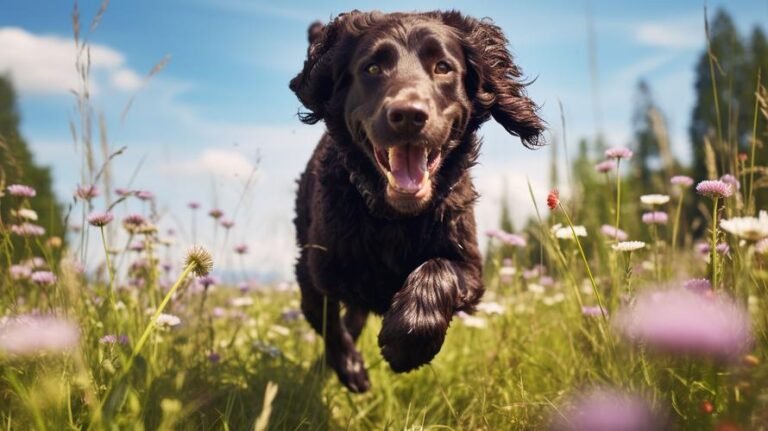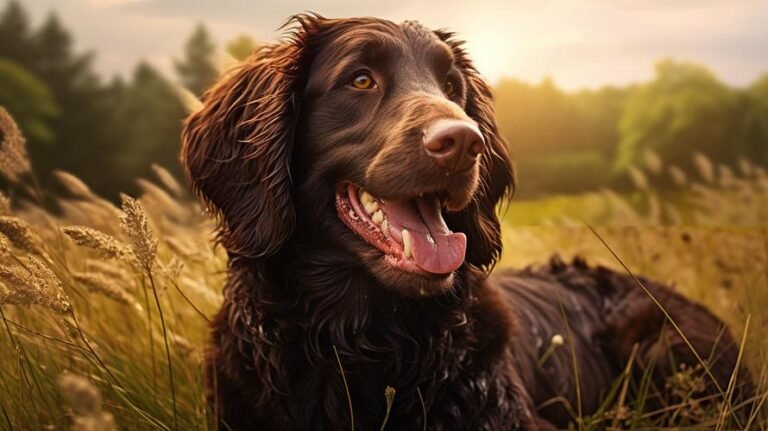You might think a dog with tightly curled locks and a glossy coat has won the genetic lottery, but did you know the Curly-Coated Retriever is actually one of the oldest retriever breeds, bred with the intention of creating an indefatigable, unflinching game retriever? Known for their intelligence, independence, and stamina, these retrievers with the regal appearance have always been more than just a pretty face!
Now, here’s a question you might have in mind – Are Curly-Coated Retrievers easy to train? The answer is a resounding YES! Right off the bat, let’s dive into why these loyal and intelligent companions are a dream to train.
At their core, Curly-Coated Retrievers, or “Curlies” as they’re fondly known, are a working breed. Originating from England, these dogs were bred to retrieve small game on both land and water, and it is this innate work-driven instinct that makes them so trainable!
However, a Curly’s independent and sometimes stubborn streak means you have to adopt a unique approach to training. With the right balance of assertiveness, patience, and immense love, you can help your Curly become an obedient and charming companion.
Let’s understand why curlies are quick to pick up commands and strategies you can use to make the most of their trainable nature.
1. Intelligence: Curlies are problem-solving geniuses. They possess a sharp intellect honed by centuries of selective breeding to perform intricate tasks. This intelligence makes them quick learners who enjoy interactive games and puzzles. A regular game of hide-and-seek or a complex puzzle treat dispenser will not only involve them physically but also mentally.
2. Positive Reinforcement: Like any other breed, Curlies respond best to positive-reinforcement training methods. Use of treats, toys, and praise will reward and reinforce their desirable behaviors. Remember, Curlies are sensitive souls beneath their rough exterior – heavy-handed techniques may work against you, causing your furry friend to become introverted.
3. Short yet Consistent Training Sessions: Curlies, despite their intelligence, have a fairly short attention span. Hence, to make the training more effective, it is suggested to have shorter but consistent training sessions, preferably multiple times a day. This stops them from getting bored and retains their interest in learning new things easier.
4. Socialization: It’s crucial to begin socializing your Curly from a young age. Expose them to various environments, people, and other animals. This will help in making them more adaptable and comfortable around others. It’s also a great way to teach them appropriate behavior and helps avoid the risk of them becoming reserved or anxious.
5. Patience: Patience is key when it comes to training a Curly. Being independent thinkers, they might test your limits at times, making you rethink their trainable nature. However, when treated with kindness and persistence, they are quick to bounce back, learning jobs as simple as fetching the newspaper to complicated tasks like assisting the differently-abled.
Remember, no two dogs are alike, and every Curly would require a unique training style best suited for them. Some might respond to treats, while others might appreciate a playful reward more.
Moreover, their training isn’t just about teaching them tricks or house manners. Regular mental stimulation is crucial to keep their intelligent minds active. Physical exercise is a necessity too – Curlies are energetic dogs that require an active lifestyle to stay profile and healthy.
In conclusion, a Curly-Coated Retriever’s capacity to learn, adapt, and conform is directly proportional to their owner’s commitment to effectively training them. Despite their independent nature, they are undeniably eager to please their family members and are always ready for an adventure, making them a joy to train!
So, whether you are into canine sports or are simply looking for a loyal and dependable companion, the Curly-Coated Retriever will not only meet but also surpass your expectations. With affectionate companionship and the right approach to training, you’ll soon discover your Curly is not just a pet, but a vital, loving part of your family.



